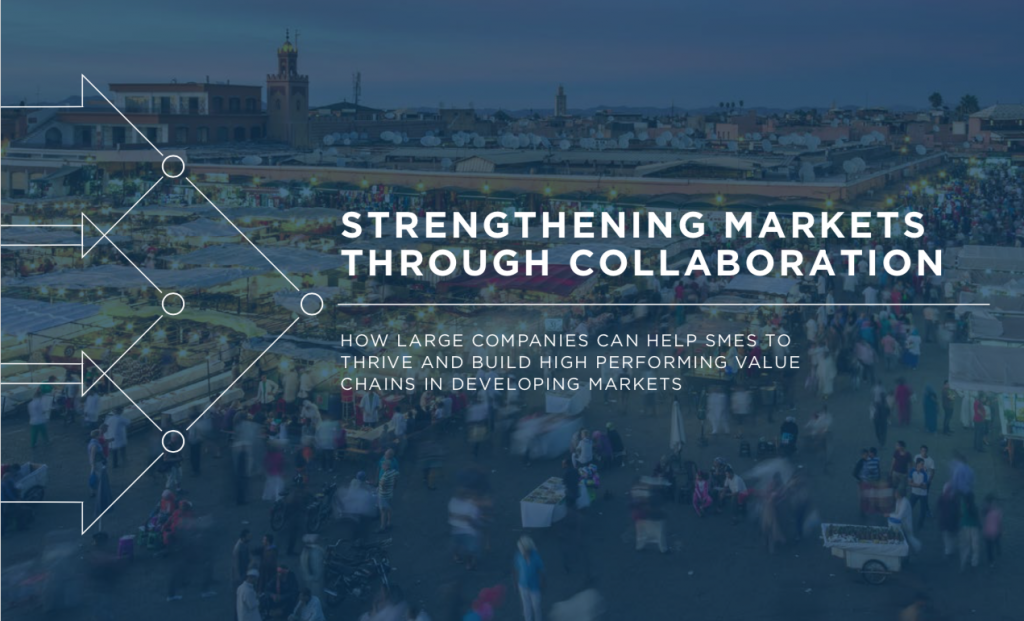The global pandemic has triggered an unprecedented surge of support for micro-, small- and medium-sized enterprises (MSMEs), both in recognition of the critical role they play in national economies and global value chains, and because of their vulnerability as global economic activity grinds to a halt. COVID-19 is making an already challenging environment for MSMEs far worse. This vulnerability is particularly acute for informal businesses in developing countries, where governments are unable to provide the social and economic support seen in developed economies.
The immediate response quite rightly has been all about mobilising resources to support livelihoods and keep MSMEs afloat in the short-term. Development finance institutions and government donors have increased lending facilities and technical support. Large companies are providing tools, information and advice to their MSME partners, often with local partners. They are also relaxing contractual terms and giving financial support in the form of cash grants and affordable loans and credit. National governments are introducing supportive policy responses and impact investors, foundations and civil society have also stepped up.
 These measures have provided short term relief. But the global crisis has also exposed the deeply entrenched, complex and interconnected challenges MSMEs face. These include access to finance, availability of skills and information, the regulatory environment, as well as markets and networks. Current support to MSMEs could be even more impactful over the long-term if these underlying issues were tackled together and there was a more concerted effort to build stronger MSME operating environments that enable sustained growth.
These measures have provided short term relief. But the global crisis has also exposed the deeply entrenched, complex and interconnected challenges MSMEs face. These include access to finance, availability of skills and information, the regulatory environment, as well as markets and networks. Current support to MSMEs could be even more impactful over the long-term if these underlying issues were tackled together and there was a more concerted effort to build stronger MSME operating environments that enable sustained growth.
The pandemic response also reminds us that many different sectors share the same goal of helping MSMEs to grow. Large companies who source from and sell via MSMEs, impact investors as well as national and donor governments, all have a vital interest in seeing MSMEs thrive. Collaboration between these actors has accelerated dramatically, showing what can be achieved if partners put their minds to it.
A new guide from Business Fights Poverty and Endeva aims to demonstrate that by combining their strengths in a systematic way, stakeholders can magnify their impact both in terms of commercial results and social impact and more effectively tackle MSME barriers to success. We have called this approach Market Building Collaboration.
The challenge of realising the potential of Market Building Collaboration lies in its complexity and the fact that each individual player only sees part of the opportunity from their own vantage point. To overcome this challenge, all sectors should focus on three priorities to unlock the potential of collaboration to help MSMEs thrive in a strong and supportive market environment after the immediate impacts of COVID-19 pass.
First, actors need to be more deliberate in identifying collaboration opportunities. There are many parallel activities currently to support MSMEs, including by large companies, national and donor governments, and impact investors. These actors should seek to create synergies and take a longer-term view to ensure their efforts have a more lasting impact.
Second, more needs to be done to facilitate collaboration to attract diverse players to the table and to encourage them to work together. Identifying the right partners for collaboration can be difficult during these times when so many initiatives are springing up in parallel, and there is a need to act quickly. Facilitation, for example by donors or existing intermediaries, can help to identify synergies and enable rapid collaboration.
Third, there is a need for more catalytic funding to enable Market Building Collaboration. Dedicated funds could help to pool money from different sources, including resources made available during the crisis, to tackle different challenges with different types of money. For example, such a fund could both invest in enabling conditions and provide finance to MSMEs.
Helping MSMEs to survive and then thrive will be critical to every country’s pathway to recovery. Market Building Collaboration has the potential to unlock MSME growth and to build resilience at a more fundamental level than individual organisations can on their own. There has never been a more important time for different sectors to come together to make this approach a reality.
This article was written by Richard Gilbert, Challenge Director Business Fights Poverty, and Dr. Christina Tewes-Gradl.


